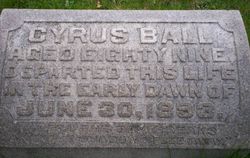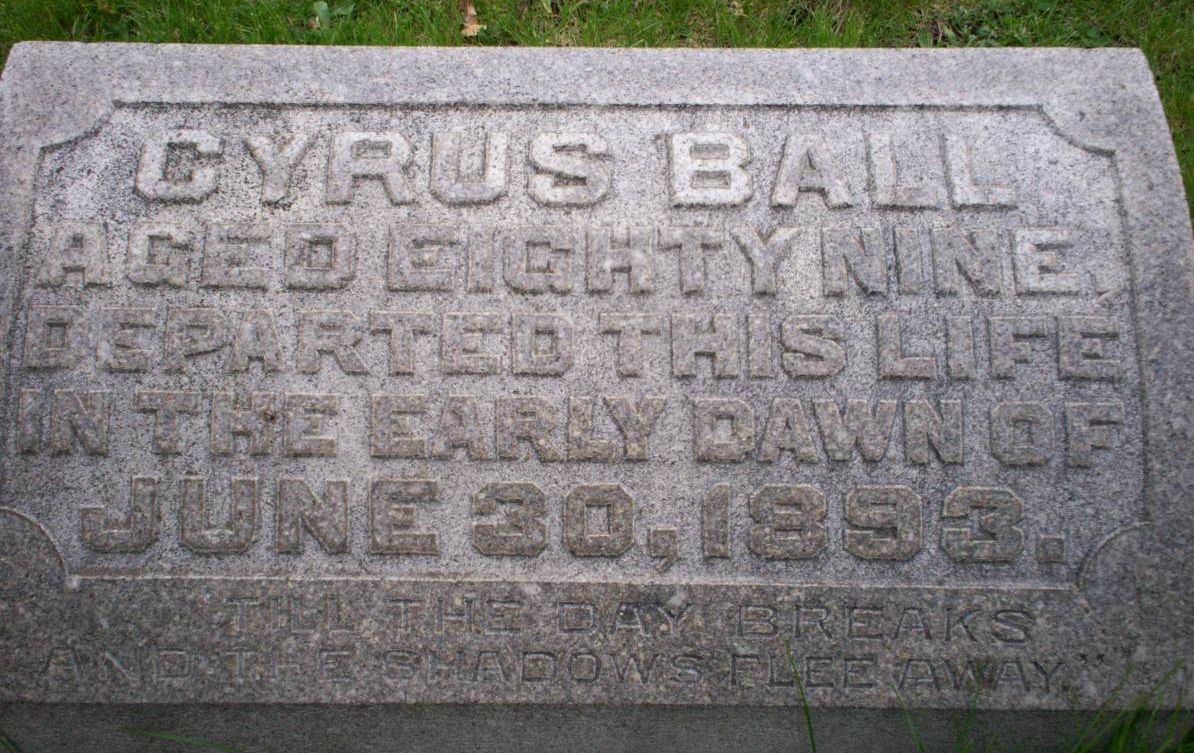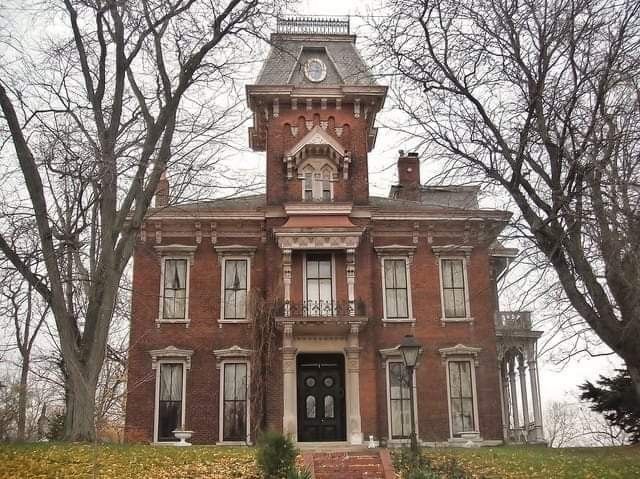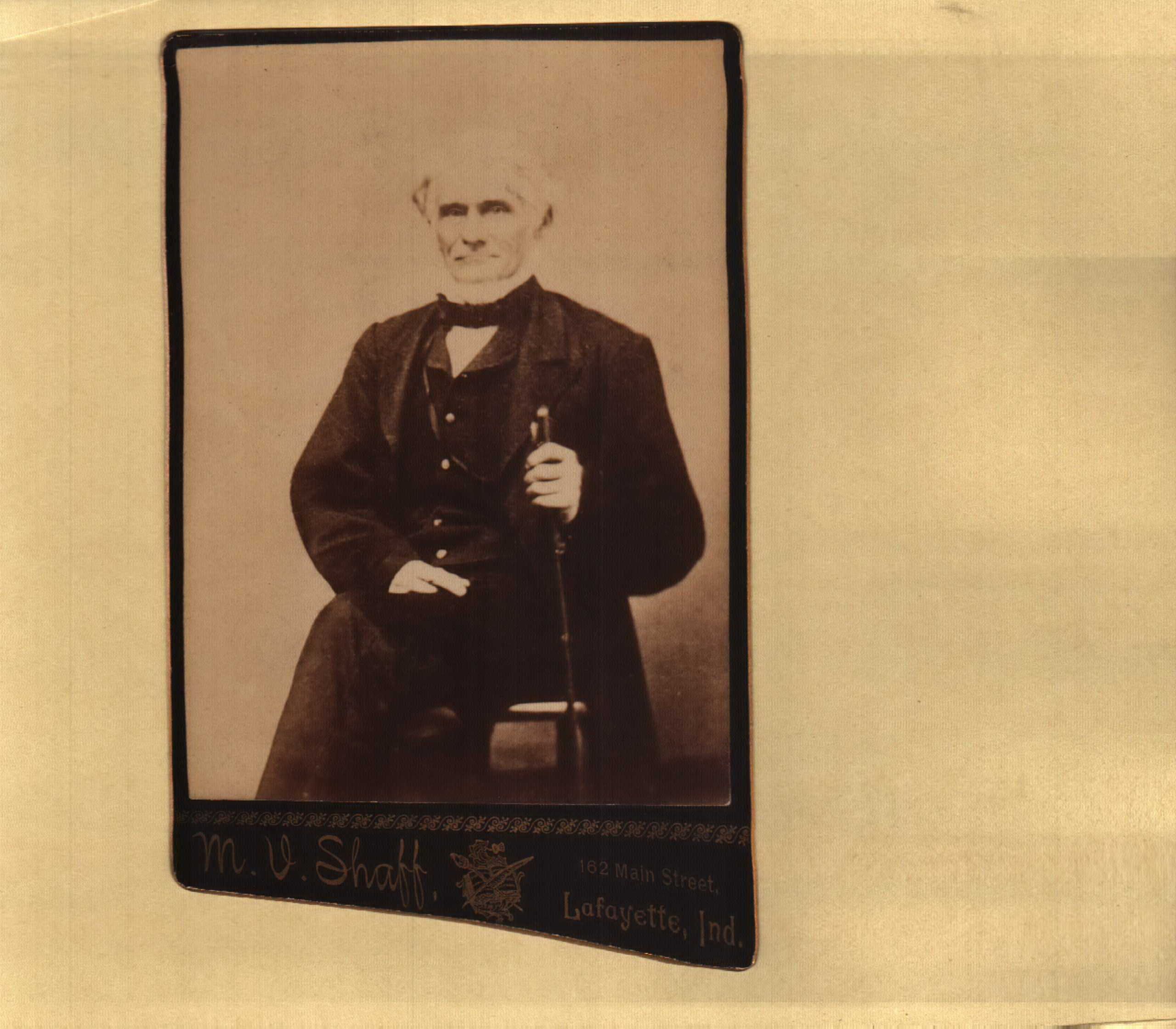JUDGE CYRUS BALL.
An enumeration of the representative citizens of Tippecanoe county of a former generation who won success and recognition for themselves and at the same time conferred honor upon the community, would be decidedly incomplete were there failure to make mention of Judge Cyrus Ball, who long held worthy prestige in legal and political circles. He was always distinctively a man of affairs, who wielded a wide influence among those with whom his lot was cast, ever having the affairs of his county at heart and did what he could to aid in its development, then passed serenely on to his eternal rest, leaving behind him a priceless heritage to his family and friends— the record of a life well spent and a good name.
Judge Cyrus Ball, long a prominent citizen of Indiana, was born in Lebanon, Warren county. Ohio, May 30, 1804, the youngest of a family of six children, four brothers and two sisters. His early education was meager, having attended schools of a primitive kind for three months during -the winter, his work on the farm depriving him of further time to devote to his text-books. However, he spent a great deal of time reading history and miscellaneous subjects, and while quite a young man was enabled to begin teaching in one of the country schools. In 1825 he left the farm and read law awhile, having at an early age decided to enter the legal profession. and he was admitted to the bar in Ohio in 1826.
He came west with his cousin, Justice Harlan, in that year. In the spring of 1827 he went to Baltimore, Maryland, and bought a stock of merchandise and brought the same to Lafayette, Indiana, and he and his brother started a general store here. After two and one-half years, Cyrus assumed entire control of the business, which had steadily grown from the first. In 1828 Cyrus Ball was admitted to the bar in Indiana and the following year he was elected Justice of the Peace, serving five years. In 1835 he was defeated for the office by Mathias Peterson, a Democrat. He then formed a partnership with James Hill and Peter S. Jennings, embarking in the dry goods business. Mr. Hill died in 1837 and the firm became Ball & Jennings. The former sold out to the latter, and, in connection with his brother, purchased the property at the northwest corner of Third and Main streets, paying the sum of one hundred and fifty dollars for the lot.
In 1832 Mr. Ball was married to Cornelia Smith, who died within three years after their marriage. On May 8, 1838, he was married to Rebecca Gordon, of Philadelphia; she was born in that city, May 16, 1816, and she came to Lafayette in 1837. To this union five children were born, namely: Gordon, Seneca, Eugene, Cornelia and Richard. Mrs. Ball was of a decidedly poetic nature, and she was always bright, cheerful and happy. She was a woman of rare intellect, of fine judgment, having wonderful powers of tact and discrimination. She penned many dainty gems of verse, some of them manifestly from the depth of the heart, and displayed a wealth of poetic genius.
When the Black Hawk war began Judge Ball and William Reynolds went to the front, passing through Chicago, at that time an insignificant little trading post. Upon their arrival there they were unable to buy enough feed for their horses, there being practically no business of this nature there.
The Wabash & Erie canal made Judge Ball collector of tolls in 1840, and in 1841 he was appointed cashier in the branch at Lafayette of the State Bank of Indiana, retaining that position until the charter expired and the bank went into liquidation. Business was carried on at the southwest corner of Sixth and Main streets until the charter expired in 1859, at which time Judge Ball purchased the lots and improvements. which are now the property of his son, Gordon Ball.
Cyrus Ball was elected one of the three associate Judges in 1840 for this district, and he was soon regarded as a splendid Jurist, fair and possessing the highest integrity. He had a mind capable of the most careful judicial analysis and he carefully weighed in the balance all problems submitted to him and soon displayed a profound knowledge of jurisprudence, his decisions seldom meeting with reversal at the hands of a higher tribunal.
When the Lafayette Artificial Gas Company was started, Judge Ball became president and held considerable stock in the same, and its large success was very largely due to his able management.
With Albert S. White, the Judge was chiefly instrumental in the construction of the railroad to Indianapolis, many years ago, which is now a part of the Big Four system. When he retired from the banking business, Judge Ball built an elegant residence on South Ninth street where he lived until his death, June 30, 1893, having reached a ripe old age, full of honors and success.
Although it was dangerous to do so, he entertained the noted William Lloyd Garrison and other well known abolitionists at his home. Mrs. Cyrus Ball joined her distinguished husband in the silent land on January 16, 1900. Her son, Seneca Ball, who became prominent in business and railroad circles. died December 19, 1907. Eugene Ball died in Vienna, while United States consul to Budapest. Cornelia Ball died just as she had blossomed into womanhood. Thus Gordon Ball, of Lafayette, is now the only living member of the family. Judge Ball was a man of unusual business ability, having been an organizer and a promoter, possessing the rare ability to foresee the outcome of business transactions and he was regarded as a leader in business circles for a half century.
He died without a blemish on his character, there having been manifest in his character the highest sense of honor and the strictest integrity. In disposition he was kind. tender. yet firm. straightforward and no man was more determined in the execution of his plans when once he decided that he was right. Broad and liberal in his views, enterprising and resourceful, he was a power in every enterprise he undertook. He took the delight of a boy in innocent sports, and nothing delighted him more than to romp with his children. His old age was cheered by frequent fishing trips to the Kankakee, Wildcat and the Wabash. His useful life ended as he had lived it—without a shade to darken its passage into the great beyond. Tippecanoe county will never know a more useful, grander character than he.
[The Past and present of Tippecanoe County, Indiana , Volume 2, page 626-628]
JUDGE CYRUS BALL.
An enumeration of the representative citizens of Tippecanoe county of a former generation who won success and recognition for themselves and at the same time conferred honor upon the community, would be decidedly incomplete were there failure to make mention of Judge Cyrus Ball, who long held worthy prestige in legal and political circles. He was always distinctively a man of affairs, who wielded a wide influence among those with whom his lot was cast, ever having the affairs of his county at heart and did what he could to aid in its development, then passed serenely on to his eternal rest, leaving behind him a priceless heritage to his family and friends— the record of a life well spent and a good name.
Judge Cyrus Ball, long a prominent citizen of Indiana, was born in Lebanon, Warren county. Ohio, May 30, 1804, the youngest of a family of six children, four brothers and two sisters. His early education was meager, having attended schools of a primitive kind for three months during -the winter, his work on the farm depriving him of further time to devote to his text-books. However, he spent a great deal of time reading history and miscellaneous subjects, and while quite a young man was enabled to begin teaching in one of the country schools. In 1825 he left the farm and read law awhile, having at an early age decided to enter the legal profession. and he was admitted to the bar in Ohio in 1826.
He came west with his cousin, Justice Harlan, in that year. In the spring of 1827 he went to Baltimore, Maryland, and bought a stock of merchandise and brought the same to Lafayette, Indiana, and he and his brother started a general store here. After two and one-half years, Cyrus assumed entire control of the business, which had steadily grown from the first. In 1828 Cyrus Ball was admitted to the bar in Indiana and the following year he was elected Justice of the Peace, serving five years. In 1835 he was defeated for the office by Mathias Peterson, a Democrat. He then formed a partnership with James Hill and Peter S. Jennings, embarking in the dry goods business. Mr. Hill died in 1837 and the firm became Ball & Jennings. The former sold out to the latter, and, in connection with his brother, purchased the property at the northwest corner of Third and Main streets, paying the sum of one hundred and fifty dollars for the lot.
In 1832 Mr. Ball was married to Cornelia Smith, who died within three years after their marriage. On May 8, 1838, he was married to Rebecca Gordon, of Philadelphia; she was born in that city, May 16, 1816, and she came to Lafayette in 1837. To this union five children were born, namely: Gordon, Seneca, Eugene, Cornelia and Richard. Mrs. Ball was of a decidedly poetic nature, and she was always bright, cheerful and happy. She was a woman of rare intellect, of fine judgment, having wonderful powers of tact and discrimination. She penned many dainty gems of verse, some of them manifestly from the depth of the heart, and displayed a wealth of poetic genius.
When the Black Hawk war began Judge Ball and William Reynolds went to the front, passing through Chicago, at that time an insignificant little trading post. Upon their arrival there they were unable to buy enough feed for their horses, there being practically no business of this nature there.
The Wabash & Erie canal made Judge Ball collector of tolls in 1840, and in 1841 he was appointed cashier in the branch at Lafayette of the State Bank of Indiana, retaining that position until the charter expired and the bank went into liquidation. Business was carried on at the southwest corner of Sixth and Main streets until the charter expired in 1859, at which time Judge Ball purchased the lots and improvements. which are now the property of his son, Gordon Ball.
Cyrus Ball was elected one of the three associate Judges in 1840 for this district, and he was soon regarded as a splendid Jurist, fair and possessing the highest integrity. He had a mind capable of the most careful judicial analysis and he carefully weighed in the balance all problems submitted to him and soon displayed a profound knowledge of jurisprudence, his decisions seldom meeting with reversal at the hands of a higher tribunal.
When the Lafayette Artificial Gas Company was started, Judge Ball became president and held considerable stock in the same, and its large success was very largely due to his able management.
With Albert S. White, the Judge was chiefly instrumental in the construction of the railroad to Indianapolis, many years ago, which is now a part of the Big Four system. When he retired from the banking business, Judge Ball built an elegant residence on South Ninth street where he lived until his death, June 30, 1893, having reached a ripe old age, full of honors and success.
Although it was dangerous to do so, he entertained the noted William Lloyd Garrison and other well known abolitionists at his home. Mrs. Cyrus Ball joined her distinguished husband in the silent land on January 16, 1900. Her son, Seneca Ball, who became prominent in business and railroad circles. died December 19, 1907. Eugene Ball died in Vienna, while United States consul to Budapest. Cornelia Ball died just as she had blossomed into womanhood. Thus Gordon Ball, of Lafayette, is now the only living member of the family. Judge Ball was a man of unusual business ability, having been an organizer and a promoter, possessing the rare ability to foresee the outcome of business transactions and he was regarded as a leader in business circles for a half century.
He died without a blemish on his character, there having been manifest in his character the highest sense of honor and the strictest integrity. In disposition he was kind. tender. yet firm. straightforward and no man was more determined in the execution of his plans when once he decided that he was right. Broad and liberal in his views, enterprising and resourceful, he was a power in every enterprise he undertook. He took the delight of a boy in innocent sports, and nothing delighted him more than to romp with his children. His old age was cheered by frequent fishing trips to the Kankakee, Wildcat and the Wabash. His useful life ended as he had lived it—without a shade to darken its passage into the great beyond. Tippecanoe county will never know a more useful, grander character than he.
[The Past and present of Tippecanoe County, Indiana , Volume 2, page 626-628]
Family Members
Advertisement
Advertisement

















